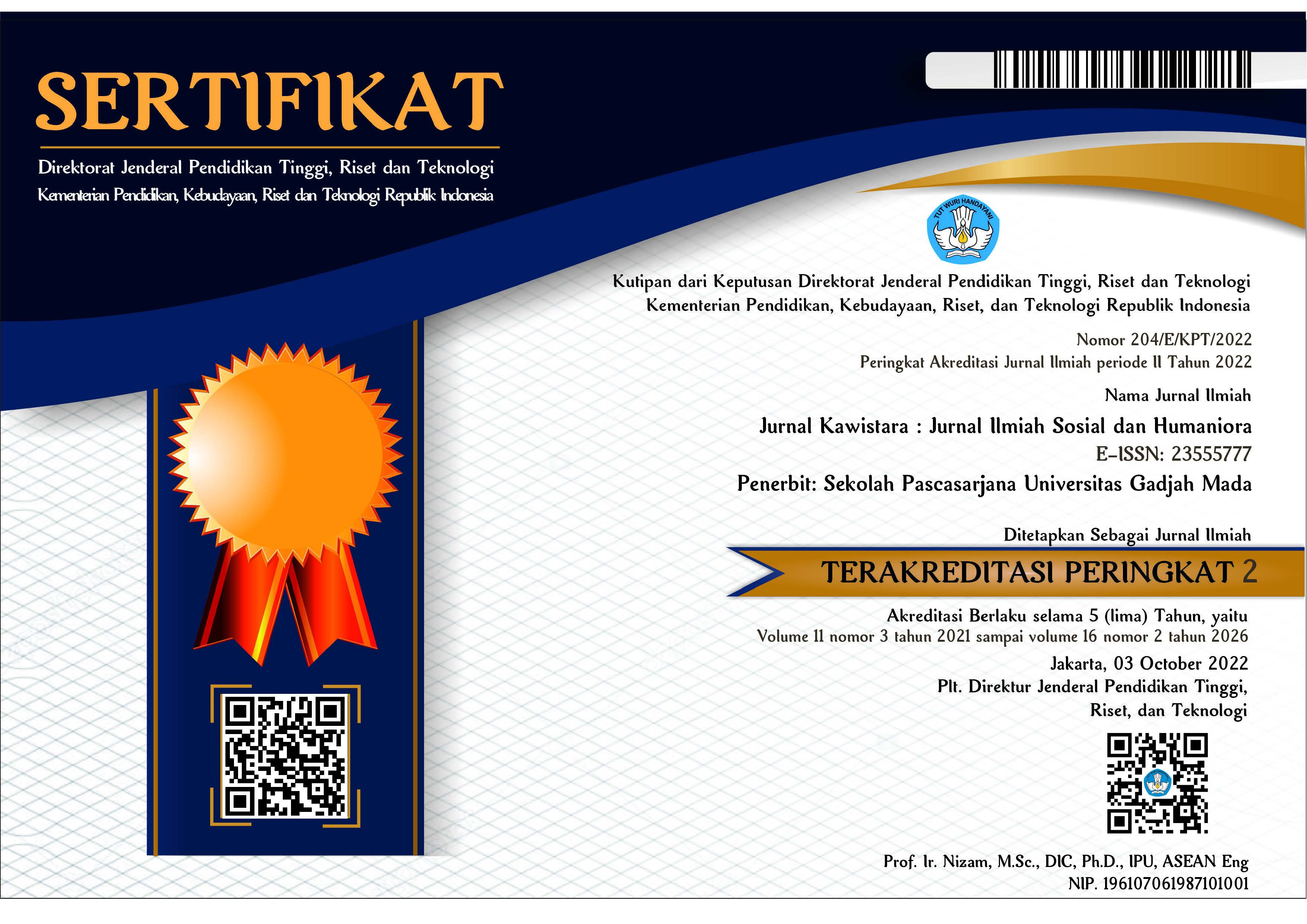PANCASILA AND THE DEVELOPMENT OF DEMOCRACY IN INDONESIA: AN AXIOLOGICAL PERSPECTIVE
Wahyudin Wahyudin(1*), Koento Wibisono Siswomiharjo(2), Kaelan Kaelan(3)
(1) Institut Agama Islam Negeri (IAIN) Metro Lampung
(2)
(3)
(*) Corresponding Author
Abstract
Pancasila, as the most powerful ideology, should be implemented by the nation leader in all spheres of life, according to life philosophy “ing ngarsa sung tuladha, Ing madya mangun karsa, Tut wuri handayani”, should be integrated in all aspects of democratic lives in Indonesia. If doing so, the society will have the mental protection of all Indonesian, all of Indonesia’s bloodshed securely, in accordance with the objectives of the Indonesian state, united, sovereign, fair, and prosperous. But in its context, Pancasila is faced with problems such as the democracy that does not prioritize aspirations to actualize social justice and prosperity, the existence of an undirected democracy, the less and lower level of public trust in the government, the loss of noble values because everything is measured by money, and an indecisive government system that led to anarchy and radicalism. The method used in this study was descriptive qualitative philosophical, describing the data consisting of arguments and contextual events. This study focused on actual problems by understanding phenomena holistically about the concept of Pancasila as the basis and direction of democracy. This study used axiology theory; the material value that is useful for human physical life and spiritual values. The results of the study showed that the ideology of Pancasila should be the foundation of society life, nation and state of Indonesia because Pancasila is still and always relevant to protect the nation’s security from radicalism, liberalism, and anarchism. As a result, the goal of Pancasila as ideology is to create fair freedom in the life of the nation.
Keywords
Full Text:
PDFReferences
Abdullah,Taufik, 2001. Nasionalisme dan Sejarah, Bandung: Satya Historika.
Agustamsyah. 2011. Konsepsi Dan Implementasi Demokrasi Pancasila Dalam Sistem Perpolitikan di Indoensia. Journal of Tapis: Teropong Aspirasi Politik Islam, 7(1):79-91.
Arisaputra, M., I. 2013. Penerapan Prinsip – Prinsip Good Governance Dalam Penyelenggaraan Reforma Agraria Di Indonesia. Yuridika, 28(2):188-216.
Asyawi, Taufiq Muhammad. 2013. Demokrasi atau Syura. Jakarta: Gema Insani.
Bazzi, S., Gaduh, A., Rothenberg, A., M. 2017. Unity in Diversity ? Ethnicity, Migration, and Nation Building in Indonesia. Working Paper, Halaman 1-62.
Berman, Lerry and Allen, B. 1996. Approaching Democracy. USA: Prentice Hall New Jersey.
Bisay, J. 2017. Pilkada Lanny Jaya Dikotori Politik Uang Di Papua. Tabloidjubi.com, accessed on 21 March 2019. Available online at https://tabloidjubi.com/artikel-3851-pilkada-lanny-jaya-dikotori-politik-uang.html
Budiarjo, Miriam. 2012. Dasar- Dasar Ilmu Politik. Jakarta: Gramedia.
Gould, Carol C. 1993. Rethinking Democracy, Freedom and Social Cooperation in Politics, Economi and Sociaty. Cambridge: Cambridge University Press.
Hamdi, Ridho Al. 2011. Praktek Demokrasi Lokal di Indonesia: Studi Kasus di Kabupaten Lampung Tengah. Journal of Studi Pemerintahan, 2(2): 355-377.
Jonathan, Sarwono. 2006. Metode Penelitian Kuantitatif dan Kualitatif. Yogyakarta: Graha Ilmu
Kaelan. 2002. Filsafat Pancasila, Yogyakarta: Paradigma.
Kaelan. 2007. Pendidikan Kewarganegaraan. Yogyakarta: Paradigma.
Kaelan. 2013. Negara Kebangsaan Pancasila, Kultural, Historis, Filosofis, Yuridis dan Aktualisasinya. Yogyakarta: Paradigma.
Kaelan. 2014. The Philosophy of Pancasila, The Way of Life of Indonesian Nation, Yogyakarta: Paradigma
Latif, Yudi. 2012. Negara Paripurna. Jakarta: Gramedia.
Maryam, S., Neneng. 2016. Mewujudkan Good governance Melalui Pelayanan Publik. Ilmu Politik Dan Komunikasi, 6(1):1-18.
Mayo, Henry B. 1960. An Introduction to Democratic Theory. New York: Oxford University press.
Miles, Matthew, B. and Huberman, A., M. 1992. Analisis Data Kualitatif. Jakarta: UI Press.
Nurtjahjo, H. 2006. Filsafat Demokrasi. Jakarta: Bumi Aksara.
Noor, J. 2011. Metodologi Penelitian Skripsi, Tesis, Desertasi, dan Karya Ilmiah. Jakarta: Kencana
Notonagoro. 1975. Pancasila Secara Ilmiah Populer. Jakarta: Pantjuran Tudjuh.
Ridho, M. 2019. Meredam Konflik Botoh dan Tawaran Uang Setan di Pilkades Serentak Cilacap Jawa Tengah. Liputan6. Accessed on March 19, 2019. Available at: https://www.liputan6.com/tag/politik-uang.
Sahrasad, H. 2016. Indonesian Pluralism and Democracy under Challenge: A Social Reflection. Al-fikr, 20(2):256-278.
Salam, A. 2018. The Hoax Phenomenon in Indonesian Society: Observing Anti-Diversity Memes since 2014. Humaniora, 30(3):315-324.
Schamandt, J, H. 1960. History of Political Philosophy. USA: The Bruce Publishing Company.
Simanjuntak, Y., S. 2017. Pemantauan dalam Proses Penyelenggaraan Pemilu. Jurnal Bawaslu, 3(3):305-321.
Sobarna, Ayi. 2002. Nilai-Nilai Demokrasi Sebagai Dasar Partisifatif, Mimbar: Jurnal Sosial dan Pembangunan, 18(1):31-35.
Sudrajat, Ajat. 2016. Demokrasi Pancasila Dalam Perspektif Sejarah. Journal Of Mozaik Jurnal Ilmu-Ilmu Social Dan Humaniora 8(1):1-.17
Sugiyono. 2009. Metode Penelitian Kuantitatif, Kualitatif . Bandung: Alfabeta.
Parray, A., Tauseef. 2012. Islamic Democracy or Democracy in Islam: Some Key Operational Democratic Concepts and Notions, World Journal of Islamic History and Civilization, 2(2):66-86.
Thoyibi, M. 2003. Filsafat Ilmu dan Perkembangannya. Surakarta: Muhammadyah University Press.
Uhlin, Anders. 2002. Globalization, Regime Transition and the Indonesian State. Paper for Annual Meeting of the American Science Association, Halaman 1-20.
Umam. 2019. Maruf Amin Sebut Kampanye Hitam yang Dilakukan Ibu-ibu di Karawang Berbahaya bagi Demokrasi, Tribunnews.com. Accessed on 16 March 2019, Avaliable Online at: http://www.tribunnews.com/pilpres-2019/2019/02/26/maruf-amin-sebut-kampanye hitam-yang-dilakukan-ibu-ibu-di-karawang-berbahaya-bagi-demokrasi?page=2..
UUD 45. 2007. Hasil Amandemen dan proses Amandemen UUD 45 secara lengkap 1999-2002. Jakarta.
Wibisono, Koento. 1983. Arti dan Perkembangan Menurut Filsafat Positivisme Auguste Comte. Yogyakarta: Gadjah Mada University Press.
Wibisono, Koento. 1999 Filsafat Ilmu dan Perkembangannya. Surakarta: Universittas Muhammadiyah.
Wibisono, Koento. 2007. Hand Out (diktat) Mata Kuliah Filsafat Ilmu. Yogyakarta: Universitas Gajah Mada, Yogjakarta.
Zulniyadi, D. 2019. Harus Percepat Pemecatan PNS Koruptor. Lampung Post. Accessed on March 3, 2019. Available Online at https://lampungpost.id/headline/ma-harus-percepat-pemecatan-pns-koruptor/
Article Metrics
Refbacks
- There are currently no refbacks.
Copyright (c) 2019 Wahyudin, dkk

This work is licensed under a Creative Commons Attribution-ShareAlike 4.0 International License.
Jurnal Kawistara is published by the Graduate School, Universitas Gadjah Mada.








